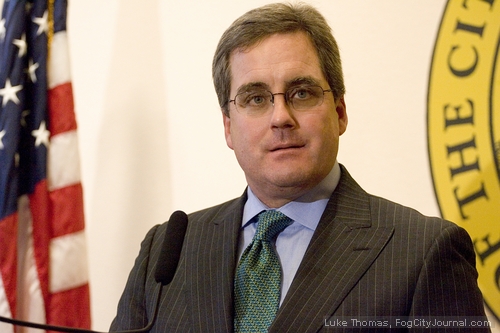
San Francisco City Attorney Dennis Herrera
Photo by Luke Thomas
From the Office of City Attorney Dennis Herrera
November 19, 2008
Debate Shifts from Same-Sex Marriage
to Core Constitutional Principles of Separation of Powers, Equal Protection
SAN FRANCISCO — The California Supreme Court today agreed to take up legal challenges to the validity of Proposition 8, the narrowly-approved initiative constitutional amendment that seeks to eliminate the fundamental right of marriage for gay and lesbian citizens. In issuing its 2-page order this afternoon, the high court directed California Attorney General Edmund G. Brown Jr. to file the state’s brief in defense of the measure’s validity by Dec. 19. Petitioners in cases representing California local governments, civil rights and religious organizations, and same-sex couples would be required to submit reply briefs by Jan. 5, 2009. The Supreme Court did not set a date for oral arguments in the case. Motions to immediately stay the same-sex marriage ban, which were brought by several of the private parties challenging Prop 8, were denied without comment.
The City and County of San Francisco was joined by Santa Clara County and the City of Los Angeles in filing public sector litigation on Nov. 5 to invalidate the measure, arguing that the California Constitution’s equal protection provisions do not allow a bare majority of voters to use the amendment process to divest politically disfavored groups of their constitutional rights. Such a sweeping redefinition of equal protection, their petition argues, would require a more procedurally elaborate constitutional revision rather than a simple constitutional amendment.
Since the original public sector legal challenge was filed two weeks ago, the counties of Alameda, Los Angeles, Marin, San Mateo and Santa Cruz, and the Cities of Oakland, Fremont, Laguna Beach and San Diego have additionally moved to join the litigation. To date, their challenge to Prop 8 unites twelve cities and counties comprising more than 17 million Californians, according to 2008 population estimates from the California Department of Finance. As lead counsel for the case, San Francisco City Attorney Dennis Herrera pledged to lead an aggressive effort to enlist additional support for the civil litigation from other California cities and counties.
“No matter what your view of same-sex marriage, it is important to understand that the passage of Prop 8 has pushed California to the brink of a constitutional crisis,” Herrera said. “This measure sought to do something that no constitutional amendment has ever succeeded in doing in our history: to strip a fundamental right from a protected class of citizens. In doing so, it did not merely undo a narrowly disfavored Supreme Court ruling. Its legal effect is nowhere near so simple or elegant. Rather, it upended a separation of powers doctrine deeply rooted in our system of governance; it trounced upon the independence of our state’s judicial branch; and it eviscerated the most foundational principle of our state’s constitution. If allowed to stand, Prop 8 so devastates the principle of equal protection that it would endanger fundamental rights of any potential electoral minority — even for protected classes based on gender, race and religion. It would mean that a bare majority of voters could enshrine any manner of discrimination against any unpopular group — and our state constitution would be powerless to disallow it.”
“Proposition 8 raised significant legal questions that impact every city and county in the State. We are heartened that the Supreme Court will hear the legal arguments we have raised in our petition,” said Ann Ravel, Santa Clara County Counsel. “It is of utmost importance to our County that we respect the equal protection rights of all of our residents, gay and straight. We are concerned about the constitutionality of Proposition 8 and want to ensure that our County Officials have certainty regarding the issuance of marriage licenses.”
Herrera concluded his remarks by saying: “As citizens, we share the blessings of a common jurisprudence. And I refuse to accept that it is beyond us to find common ground in its enduring and deeply American principles: equality under the law; separation of powers; an independent judiciary. These are the stakes. No momentary controversy, no fear of progress or change — no matter how worrisome or heartfelt — is worth endangering them. We cannot simply amend equal protection to render it meaningless. On that basis, I am hopeful that the Supreme Court will recognize Proposition 8 as invalid, and strike it down.”
The public sector case is City and County of San Francisco et al. v. Mark B. Horton, et al. (S168078). Other cases brought by private parties are: Strauss v. Horton (S168047); Tyler v. State of California (S168066); Asian Pacific American Legal Center v. Horton (S168281); Equal Rights Advocates and California Women’s Law Center v. Horton (S168302); and California Council of Churches v. Horton (S168332).


 The Hunger Site
The Hunger Site
November 20, 2008 at 6:24 am
I’m beginning to be wore down by latent voter results. Report something new. Its going to happen whether you like it or not.